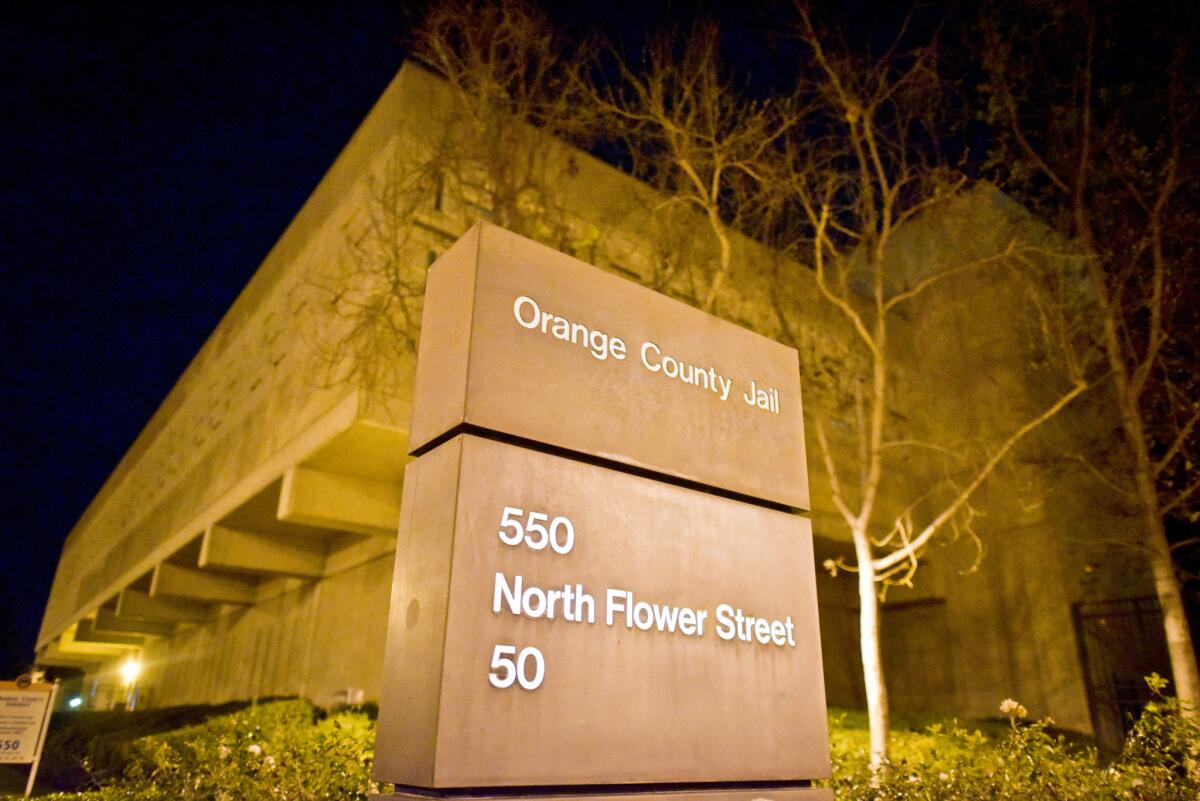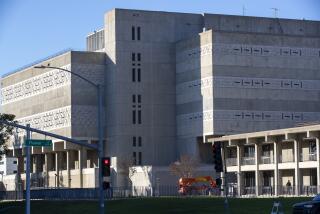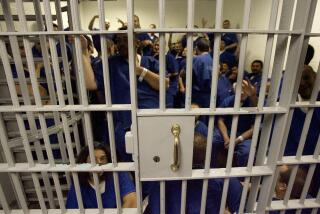Editorial: O.C. prosecutors’ jailhouse snitch scheme needs a thorough investigation

The Orange County Jail on March 13.
One of the girders buttressing the American criminal justice system is the right of people charged with crimes to have an attorney and to have that lawyer on hand when questioned by investigators and prosecutors. Within that framework, courts have held that investigators can’t plant jailhouse informants in cells with, or next to, defendants in the hope of eliciting incriminating statements. The legal reasoning, which is sound, is that in such circumstances the informants are acting as agents of the police, and their attempts to engage defendants in conversations circumvent the right to have counsel present during questioning. Separately, prosecutors also must divulge any information that might aid the defense, including details that could impugn the credibility of their informants.
The Orange County Sheriff’s Department and the district attorney’s office, however, appear to have acted for years as though those rules don’t apply to them. The scope of their transgressions remains unclear, but complaints by Assistant Public Defender Scott Sanders in two high-profile cases have revealed a network of jailhouse informants that has called into question a number of the D.A.’s prosecutions amid suspicions of systemic misconduct.
The Orange County’s Sheriff’s Department and the district attorney’s office...appear to have acted for years as though the rules don’t apply to them.
The situation is a mess. The potential constitutional violations came to light when a jailhouse informant was uncovered during the penalty phase of the capital case against Scott Dekraai, who pleaded guilty last year to the 2011 murders of his former wife and seven other people in a Seal Beach beauty salon. After the Sheriff’s Department argued that it did not target defendants with informants, evidence surfaced of a 25-year-old database used to track the positioning of informants among cells in the county jail, including details on who ordered their re-positioning and why. Saying prosecutors had shown a “chronic failure” to divulge such information as required, Orange County Superior Court Judge Thomas Goethals in March removed the entire D.A’s office from the Dekraai sentencing. State Atty. Gen. Kamala D. Harris’ office is now handling that task.
Dist. Atty. Tony Rackauckas and Sheriff Sandra Hutchens have denied serious misconduct by their offices, but both also said they have instituted reforms. Rackaukas has formed an external committee to look into his department’s policies and asked Harris to investigate the county’s use of informants, which are positive steps. But the attorney general’s office may not be an objective arbiter. In a court filing appealing the ruling that removed the D.A.’s office from the Dekraai case, the attorney general said blame for any misconduct was “solely attributable” to the Sheriff’s Department, raising questions about whether the office has pre-judged what occurred.
Meanwhile, as the judge entertained motions by the public defender’s office questioning the conduct of the D.A.’s office, Rackauckas’ prosecutors began filing motion after motion to block Goethals from hearing other criminal cases — a tactic that the Orange County Bar Assn. formally condemned. Rackauckas denied there was an orchestrated campaign, the effort quacked and waddled like a vengeful duck, and Rackauckas’ denials were not credible.
Now a group of legal scholars, former prosecutors and civil liberties advocates have asked the U.S. Department of Justice to investigate Orange County’s use of jailhouse informants and “concealment of informant-related evidence.” That would be a prudent step, given the potential conflict caused by having the same state agency that is investigating the D.A.’s office simultaneously pursuing its death penalty case against Dekraai.
We should note that there is nothing illegal about prosecutors using testimony obtained by informants on their own initiative, whether they are in jail or free. But it is illegal for prosecutors and investigators to orchestrate informants’ efforts to elicit information from any defendant who has an attorney. And it is illegal for prosecutors to sit on potentially exculpatory information.
Such transgressions are not mere technical issues. They violate a fundamental right to a defense attorney and a fair trial. If the officials responsible for respecting and protecting those rights have transgressed, the public — and Orange County voters — need to know.
Follow the Opinion section on Twitter @latimesopinion and Facebook
More to Read
A cure for the common opinion
Get thought-provoking perspectives with our weekly newsletter.
You may occasionally receive promotional content from the Los Angeles Times.






